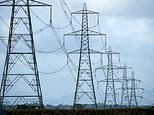Now firms could work from home to cut their ENERGY BILLS
Now firms could WFH to cut their ENERGY BILLS: One in three bosses warn they could shut offices over winter to avoid soaring costs
30% of firms have considered temporarily closing offices if they can, poll findsResearch finds companies are trying to pass on cost of soaring energy prices62% small businesses worried about rising energy costs, says Smart Energy GB
<!–
<!–
<!–<!–
<!–
(function (src, d, tag){
var s = d.createElement(tag), prev = d.getElementsByTagName(tag)[0];
s.src = src;
prev.parentNode.insertBefore(s, prev);
}(“https://www.dailymail.co.uk/static/gunther/1.17.0/async_bundle–.js”, document, “script”));
<!–
DM.loadCSS(“https://www.dailymail.co.uk/static/gunther/gunther-2159/video_bundle–.css”);
<!–
Nearly a third of small businesses are considering plans to force their staff to work from home over winter, to pass on the cost of soaring energy prices.
Research from Smart Energy GB, a smart meter company, found that 30 per cent of companies in Britain have considered temporarily closing workplaces if they can.
Energy bills are set to soar amid a huge increase in the price of buying gas on the global market, a squeeze which has put many energy suppliers out of business.
Now 62 per cent of small businesses are worried about rising energy costs and whether it will affect their ability to operate over winter.
Energy bills are set to soar amid a huge increase in the price of buying gas on the global market
‘Small businesses are the beating heart of the British economy but it is clear concerns about energy use are affecting how many of them will continue to operate this winter,’ said Iagan MacNeil, Smart Energy GB’s head of policy.
Companies are now planning to tighten their belts, as more than nine in ten say they are trying to become more energy efficient.
And 57 per cent of employees say they are doing their bit to try to save money for their employer by reducing their energy use.
However the survey also found that 60 per cent charge their phones at work to avoid doing it at home, while 29 per cent shower at work.
‘Whether it’s turning off unused equipment or ensuring your bills are accurate, it all adds up. But the solution needs to be a collaborative approach with everyone playing a part.
The cheapest energy tariffs on the market are now more expensive than Ofgem’s price cap
‘Many businesses are eligible to get a smart meter installed on their premises and this can help by giving you more control over your energy spend – a vital tool for those worried about rising prices.
‘To find out if your business is eligible for a smart meter, contact your energy supplier.’
It comes after Labour said yesterday that those living in poverty are paying more on average for their gas and electricity than those who live more comfortably.
Analysis from the party found the poorest 10 per cent of households pay on average £756 a year per person for electricity, gas and other fuels.
Labour said this was an extra 50 per cent above what the richest households pay, at £504 per person on average, and more than the national average at £530.
Shadow chancellor Rachel Reeves also said yesterday that if Labour was in power, the cost of living crisis would be at the centre of Wednesday’s Budget.
Meanwhile, the Liberal Democrats called for a windfall tax on gas producers profiting from record-high prices to help support struggling households and businesses this winter.
The Lib Dems said that wholesale gas prices had risen from 56p/therm during the first half of the year to 150p/therm and are now reaching 300p/therm.
Before that, natural gas prices had never reached 100p/therm.
The party said Serica Energy, a North Sea gas company responsible for 5 per cent of the UK supply, had already stated it expects ‘significant returns’ due to the increase and that Serica’s share price had surged from 156p per share at the end of August to 232p on Wednesday.
A Government spokesman said: ‘Protecting consumers is our top priority which is why our energy price cap will remain in place.
‘We are also supporting vulnerable and low-income households further through initiatives such as the £500 million Household Support Fund, Warm Home Discount, winter fuel payments and cold weather payments.
‘Domestic fuels such as gas and electricity are already subject to the reduced rate of 5 per cent of VAT.’
![]()


